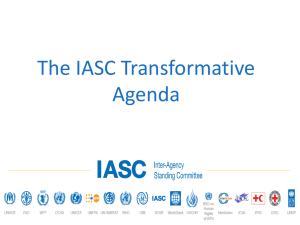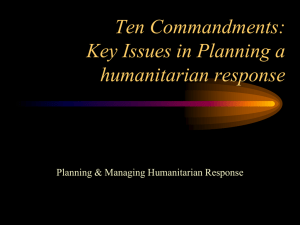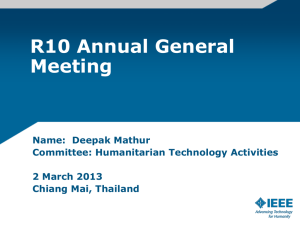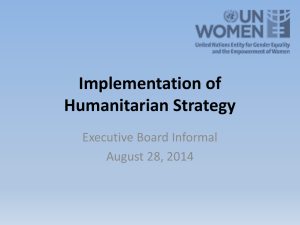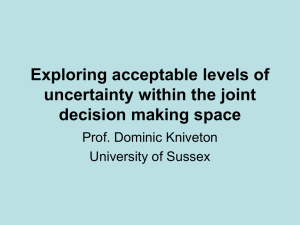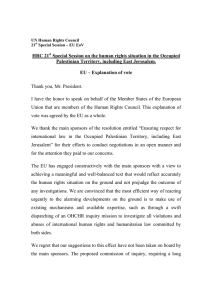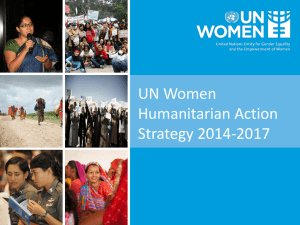WHS General Briefing
advertisement
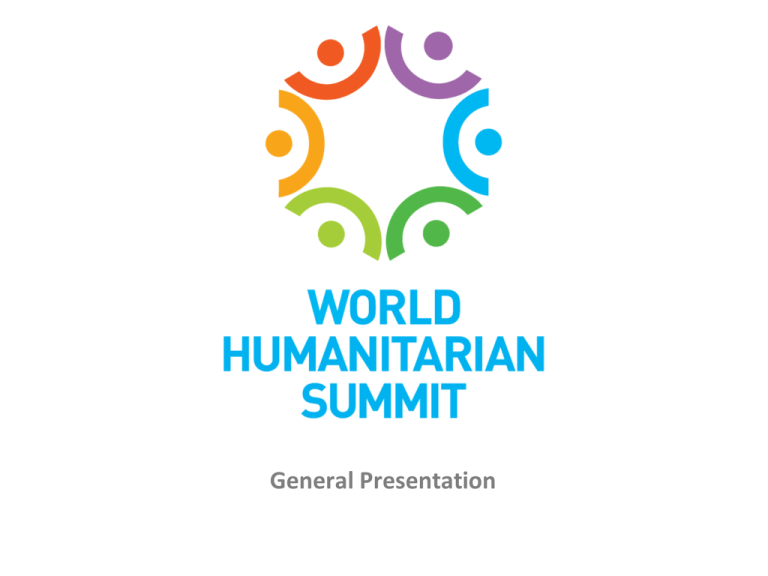
General Presentation Why: The changing humanitarian landscape… Challenges Opportunities Why: Changing Humanitarian Landscape • More severe and frequent crises – 100 million people seeking humanitarian assistance in each of the last three years. People with humanitarian needs will double between 1990 and 2025. • Limited resources – funding requirements have more than doubled to over USD 10 billion per year. Losses due to disaster amont to USD 100 bn. Yet not enough investment in preparedness and prevention (only 3% spent on prevention and preparedness) • New actors and models of assistance. Technology, access to information, mobile phones, 50% of developing countries will have access to internet – access to information. In September 2013, the UN S-G called for a World Humanitarian Summit in 2016. All humanitarian stakeholders – governments, UN, NGOs, affected communities, the private sector and other partners – will come together to build from successes and create an agenda for the future, that is: inclusive, effective and accountable Objectives Set a forward-looking humanitarian agenda, to ensure the humanitarian system is fit to respond to future challenges. • The summit will be an opportunity to take stock of achievements, share lessons and good practices. • First ever World Humanitarian Summit in May 2016 in Istanbul, Turkey. The Summit process will seek input from four stakeholders National governments • Affected countries, donors and interested governments Associated partners • • • • Private sector Militaries Charities and foundations South-South bilateral Meeting the humanitarian needs of people Community responders • Affected people and their local and community organizations • Diaspora Formal international network of humanitarian organizations • UN agencies, regional and international organizations • Civil society organizations international, regional, national • Think tanks and academia WHAT: Four Themes - Accountability to needs and expectations of affected people, host states, donors, agencies, implementing organizations - Definitions, principles and systems - Elements: transparency, accountability, performance, professionalization, standardization, data sharing - New business model to align humanitarian and development approaches in a more complex operating environment - Joined-up planning, prioritizing and funding programs - Elements: Disaster risk reduction, resilience, transition, preparedness, capacity building - Explore strategic ways to adapt and improve – a proactive vs. reactive system - Creating a system that is open to experimentation and systematic thinking about improvement - Identify and implement new products, processes and positions to face operational challenges - Strengthening the capacity of the humanitarian system to reach people with lifesaving assistance and protection, prevent and respond to displacement, and meet the specific needs created by violence in urban settings. - Elements: protection, access, displacement Partnerships Themes will be developed and defined through consultations with partners Types of Consultations • • • • Thematic consultations Regional consultations Online platform Linkages with ongoing processes: post2015; Sendai; Climate Change Conference Regional Consultations Region Timeframe 1 Western and Central Africa (in Abidjan) 19-20 June 2014 2 North and Southeast Asia (in Tokyo) 23-24 July 2014 3 South and East Africa October 2014 4 Eastern and Western Europe and Other Groups (WEOG) February 2015 5 Middle East and North Africa March 2015 6 Latin America and the Caribbean (in Guatemala) April 2015 7 Pacific Islands Q2-2015 8 South and Central Asia Q2 or Q3-2015 9 Global Consultation Q4 – 2015 Online Consultations Inform, Update, Engage • • • • • • Launches on 5 May 2014 Share information about WHS process Reach a ‘wider’ audience Provide a forum for discussions, voting, collaboration Solicit input for regional consultations Share findings during/between regional consultations Architecture • World Humanitarian Summit Secretariat • Thematic Teams • Regional Steering Groups A summit secretariat is being set up on behalf of the S-G to facilitate the process and deliver on the target outputs Director WHS Secretariat Operations Functions: Output 1 Output 4 Output 7 Output 9 • General operational support including procurement, HR, logistics and finance • Financial and donor reporting • IATI (transparency) Strategic Planning and Outreach Team Functions: Output 2 Output 4 Output 7 Output 8 Output 9 Thematic Coordination Team Functions: Output 3 Output 5 Output 6 Output 7 Output 9 • Support to regional and global consultations • Support to work of thematic teams • Advocacy and outreach • Support drafting of background documents for regional consultations. • Internal and external communications • Management of online consultations • Coordination of regional input to Secretary- General’s report • Support to summit organisation • Overall drafting and coordination of SecretaryGeneral’s Report • Connectivity with other related ongoing thematic initiatives (UN system and humanitarian) • Support to summit organisation Geneva Liaison Officer Functions: All 9 outputs • Liaise with Geneva humanitarian community on all outputs World Humanitarian Summit Thematic Team Structure RCs/HCs Intergovernmental and post-2015 discussions Thematic Team (1 of 4) WHS Thematic Coordinator (100%, P4) Regional consultations with four constituencies Thematic Team Members (30%) Listening Project Ongoing Feedback from interviews with affected people Occasional workshops and brainstorming sessions Private sector consultations Ongoing processes: IASC, WEF, DRD, etc. Global network of thematic experts Agency contributions Task Team Members: Core team of 8-10 experts to contribute 20-30% of full time at home organization to design and carry out consultations with broader network of experts, gather substantive inputs and draft recommendations to set Summit agenda. Global Expert Network: Experts on each theme from around the world and across the humanitarian community are brought in on an as-needed basis to contribute views, lessons learned and substantive inputs – no cumbersome ‘working group’ commitment WHS Thematic Coordinator: Experts on each theme are based in WHS Secretariat to lead work of thematic task teams and ensure that the concrete asks and recommendations are generated to shape the Summit agenda by mid2015 - time commitment is 100%. Regional Steering Groups • 1 Regional Steering Group/ Regional Consultation • Co-Chairs: Host country +++ • Secretariat: OCHA • Function: issues/theme, agenda, participants, input into background doc, endorsement of report from regional consultation, network Join us. www.worldhumanitariansummit.org whs@un.org

